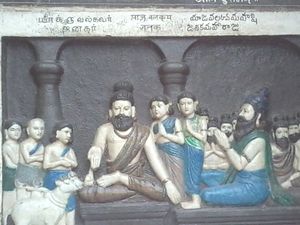ياجناڤالكيا
ياجناڤالكيا | |
|---|---|
 ياجناڤالكيا يدرِّس براهما ڤيديا للملك جناكا | |
| شخصية | |
| الديانة | الهندوسية |
| الزوج | مايتريي، كاتياياني |
| الفلسفة | أدڤايتا |
| التكريم | ريشي |
| مقالات عن |
| الهندوسية |
|---|
 |
ياجناڤالكيا (بالسنسكريتية: याज्ञवल्क्य, Yājñavalkya) هو ناسك ڤدي في الهندوسية.[1][2] وهو مذكور في أقدم النصوص الأوبانيشادية،[3] وغالباً عاش في ڤيدِها مملكة شمال بيهار حوالي القرن الثامن ق.م.،[4][5] أو القرن السابع ق.م..[6]
وحسب بن عامي شارفشتاين – أستاذ شرف للفلسفة في جامعة تل أبيب، Yajnavalkya was one of the earliest philosophers in recorded history, after Aruni.[4] Yajnavalkya proposes and then debates metaphysical questions about the nature of existence and impermanence, expounds the epistemic doctrine of neti neti ("not this, not this") to discover the universal Self and Ātman.[7] He renounced worldly attachments, and his renunciation ideas have been important to the Hindu sannyasa traditions.[8]
Yajnavalkya is credited to be the one who coined the word Advaita (non-dual, monism), one of the important traditions within Hinduism.[9] Numerous texts are attributed to him, such as the Yajnavalkya Smriti, Yoga Yajnavalkya and texts of the Vedanta school.[10][11] He is also mentioned in various Brahmanas, Aranyakas and Upanishads.[10]
Yajnavalkya is also famed in the Indian tradition for being a Vedic scholar who welcomed participation of women in Vedic studies, and Hindu texts present some of his most significant philosophical ideas in the form of his dialogues with two women, Gargi and Maitreyi.[12]
التاريخ
يُقدّر أن ياجناڤالكيا عاش حوالي القرن الثامن ق.م.،[13] or 7th century.[6]
النصوص

انظر أيضاً
الهامش
- ^ Frits Staal (2008). Discovering the Vedas: Origins, Mantras, Rituals, Insights. Penguin Books. p. 3. ISBN 978-0-14-309986-4., Quote: "Yajnavalkya, a Vedic sage, taught..."
- ^ "Hinduism vs Hindutva: The search for an ideology in times of cow politics".
- ^ Patrick Olivelle (1998). Upaniṣads. Oxford University Press. pp. 3, 52–71. ISBN 978-0-19-283576-5.
- ^ أ ب Ben-Ami Scharfstein (1998), A comparative history of world philosophy: from the Upanishads to Kant, Albany: State University of New York Press, pp. 9-11
- ^ H. C. Raychaudhuri (1972), Political History of Ancient India, Calcutta: University of Calcutta, pp. 8-10, 21–25
- ^ أ ب Patrick Olivelle (1998). Upaniṣads. Oxford University Press. p. xxxvi with footnote 20. ISBN 978-0-19-283576-5.
- ^ Jonardon Ganeri (2007). The Concealed Art of the Soul: Theories of Self and Practices of Truth in Indian Ethics and Epistemology. Oxford University Press. pp. 27–28, 33–35. ISBN 978-0-19-920241-6.
- ^ Patrick Olivelle (1992). The Samnyasa Upanisads: Hindu Scriptures on Asceticism and Renunciation. Oxford University Press. pp. 92, 140–146. ISBN 978-0-19-536137-7.
- ^ Frits Staal (2008). Discovering the Vedas: Origins, Mantras, Rituals, Insights. Penguin Books. pp. 365 note 159. ISBN 978-0-14-309986-4.
- ^ أ ب خطأ استشهاد: وسم
<ref>غير صحيح؛ لا نص تم توفيره للمراجع المسماةfisher55 - ^ Patrick Olivelle (1993). The Asrama System: The History and Hermeneutics of a Religious Institution. Oxford University Press. pp. 92 with footnote 63, 144, 163. ISBN 978-0-19-534478-3.
- ^ Patrick Olivelle (1998). Upaniṣads. Oxford University Press. pp. xxxvi–xxxix. ISBN 978-0-19-283576-5.
- ^ Ben-Ami Scharfstein (1998). A Comparative History of World Philosophy: From the Upanishads to Kant. State University of New York Press. pp. 56–57. ISBN 978-0-7914-3683-7.
ببليوجرافيا
- Brereton, Joel P. (2006). "The Composition of the Maitreyī Dialogue in the Brhadāraṇyaka Upaniṣad". Journal of the American Oriental Society. 126 (3). JSTOR 20064512.
{{cite journal}}: Invalid|ref=harv(help) - Deussen, Paul (2010). Sixty Upanishads of the Veda. Motilal Banarsidass. ISBN 978-81-208-1468-4.
{{cite book}}: Invalid|ref=harv(help) - Hino, Shoun (1991). Suresvara's Vartika On Yajnavalkya'S-Maitreyi Dialogue (2nd ed.). Motilal Banarsidass. ISBN 978-81-208-0729-7.
{{cite book}}: Invalid|ref=harv(help) - Hume, Robert (1967). Brihadaranyaka Upanishad. (Translator), Oxford University Press.
{{cite book}}: Invalid|ref=harv(help) - Larson, Gerald James; Bhattacharya, Ram Shankar (2008). The Encyclopedia of Indian Philosophies: Yoga: India's philosophy of meditation. Motilal Banarsidass. ISBN 978-81-208-3349-4.
{{cite book}}: Invalid|ref=harv(help) - Marvelly, Paula (2011). Women of Wisdom. Oxford: Osprey Publishing. ISBN 978-1-78028-367-8.
{{cite book}}: Invalid|ref=harv(help) - Mohan, A. G., translator (2013). Yoga Yajnavalkya (2nd ed.). Svastha Yoga. ISBN 978-9810716486.
{{cite book}}:|first=has generic name (help)CS1 maint: multiple names: authors list (link) - Pechilis, Karen (2004). The Graceful Guru: Hindu Female Gurus in India and the United States. Oxford University Press. ISBN 978-0-19-514537-3.
{{cite book}}: Invalid|ref=harv(help) - White, David Gordon (2014). The "Yoga Sutra of Patanjali": A Biography. Princeton University Press. ISBN 978-0691143774.
{{cite book}}: Invalid|ref=harv(help) - Joseph, George G. (2000). The Crest of the Peacock: Non-European Roots of Mathematics, 2nd edition. Penguin Books, London. ISBN 0-691-00659-8.
- Kak, Subhash C. (2000). 'Birth and Early Development of Indian Astronomy'. In Selin, Helaine (2000). Astronomy Across Cultures: The History of Non-Western Astronomy (303-340). Boston: Kluwer. ISBN 0-7923-6363-9.
- Teresi, Dick (2002). Lost Discoveries: The Ancient Roots of Modern Science - from the Babylonians to the Maya. Simon & Schuster, New York. ISBN 0-684-83718-8.
